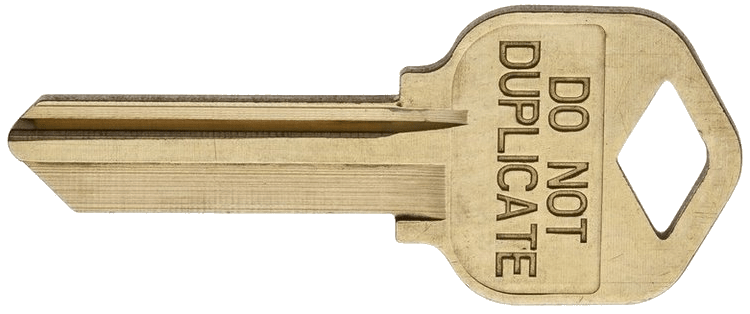The Truth Behind "Do Not Duplicate" Keys and Security
Updated: May 22, 2018 at 1:28 PM EST, Tampa FLBy: Tere Scott
Don't be fooled by the implied security on a key stamped, "Do Not Duplicate"! These keys, sometimes referred to as DND keys, are no more secure than any other typical key, and they are often sold to naive customers for a higher price by unethical locksmiths, who also have no conscience against making copies of the key, with the empty promise of better security.

Unless the key is a restricted, high-security cut, the request to not copy the key are just words with an empty warning
For most DND keys, these words stamped onto the metal serve as nothing more than an empty warning, much like a yard sign warning of a ferocious dog when there isn’t even a puppy on the premises, or an alarm system warning sign when a house is actually disarmed. Yes, the key is clearly marked with the intent of not having multiple copies of it floating around, possibly in the hands of strangers or those wanting to use it to break in.
However, these three little words stamped into the head of key are not going to stop someone set on getting a copy from duplicating it seeing as how any key can be copied at a local hardware store or even Walmart self service key machines like key.me or Minute Key. Keep in mind that these key duplicating companies are not the ones doing anything unethical with their machines that are intended to make it convenient to get a quick copy of a key you own the rights to.
Why "Do Not Duplicate" keys and why they offer a false sense of security
Years ago, business and property owners started stamping "Do Not Duplicate" on their keys in an effort to try to control who could gain access to their buildings or rooms within these buildings. Maybe it was a key to a hotel room, for instance. The hope was that when an employee was terminated, a tenant moved out, or a new person reserved a hotel room, their keys would be turned in. But, if not, the keys would be unable to be copied because the DND message stamped onto the key would alert whoever was attempting to make a copy.
The idea may be the start of a step in the direction of security, but the truth is that someone who wants to retaliate against a former employer or roommate or break into a lock is not going to stop simply because there is a warning message on the key. This is like trying to stop someone from swimming in a lake by sticking up a "No Swimming" sign and nothing else, or putting up a sign in a bank that says, "No robbers". If someone wants to have that key duplicated, all they have to do is take it to a key duplicating machine or ask a willing locksmith.
A truly secure key is manufactured to be restricted and difficult to duplicate
To make a key truly secure, We recommend using a high-security restricted key that only specialized professionals will be able to duplicate. Specific key manufacturers, such as Mul-T-Lock, Assa, Schlage, Primus, Abloy, or Medecco, offer this option. These keys are designed with specific dimple cuts that require special duplicating equipment to get a copy. Additionally, distribution of the blanks to these keys are highly controlled to limit access to the ability of making a copy in the first place.
Another way to make sure your key is highly secure is to make the lock difficult to pick, drill open, or bump. Some lock manufacturers add an extra level of security by designing the lock with additional pins. Others include more durable hardware that is nearly impossible to drill through or force open.
There is a difference between restricted and unrestricted keys
A qualified professional will also understand the difference between restricted keys and unrestricted keys. Restricted keys are those that require special permissions before they can be copied. Many restricted keys hold a unique patent and equipment needed that allow only approved manufacturers to create them and, even if you try, these keys are difficult to duplicate. Unrestricted keys, on the other hand, are no different than any traditional metal key. They don't need special equipment or permissions to duplicate them even if they are stamped with warnings that beg otherwise.
Duplicating a restricted key can be done with proper rights
When you present your DND-stamped key to a trusted locksmith professional, expect to be asked for identification and documentation. Be prepared to provide the name of the person who will be given permission to duplicate and obtain the key, which keys you are allowing to be copied, how many keys are being authorized for duplication, as well as basic contact information for the authorized person in charge of requesting the key duplication.
Copying keys is one of the most violated security policies
The simple rule remains: If you do not have control over your keys, you do not really have security. Our company takes the idea of security seriously, and we have adopted a policy toward DND keys stamped with the words, "Do Not Duplicate". We handle requests to make a copy of a DND key the same way we handle the process of copying an unrestricted key. Our policy is to inform the consumer that the use of such key does not ensure security, and that the implication of the DND stamped words is deceiving.
Follow @LocksmithTampa3











